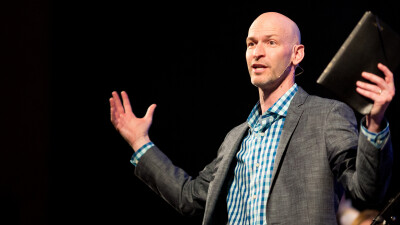A few months back, our Eagle Students team felt led to dive into a tough topic, spurred on by our mandate to love God and love others well. The venue: a Second Sunday lunch to address white privilege, diversity, and Jesus. As a 100% white team, we knew we could hardly adequately address this without help, so we invited two Eagle church members, Skye Berger and Yamil Acevedo, to be a part of the planning and execution of the event.
Little did we know that God, in His impeccable timing, would have our discussion take place one week after the heartbreaking events in Charlottesville. What stands out most, more than the high school lunch itself, was what our team experienced during the planning stages.
I wasn’t sure what to expect when the six of us gathered to plan the Wednesday after Charlottesville. I am from an area of the country that is much more diverse than our current context. I’ve seen the church embrace the diversity of God’s people in some amazing ways, and I’ve also seen blatant racism (including from those who claim Christ). But what about here? What about the northwest suburbs of Indianapolis? What experiences have our non-white brothers and sisters experienced, and what would Jesus have us do?
One thing became clear: to do nothing is not an option—and that’s probably what we (but I’ll just stick to “I”) have done. I can’t pretend to be the spokesperson for white people, but I remember the feelings I had when terms like “white privilege” would come up. “But I’ve never done those things!” “If this is privilege, I don’t want it!” Let’s be real, folks: that’s called being defensive. At its core, defensiveness creates a blind spot, eliminating any chance of momentarily seeing that someone’s experience may be vastly different from our own, and that it could be because of the color of their skin.
The first time I began to understand white privilege, micro-aggressions, and the lingering systematic issues in our culture was when I was in grad school. That was already a few years ago, and I have a long way to go when it comes to both understanding and hopefully being a part of the change.
Each of us found ourselves in a different place. In the midst of our meeting, it became clear that one individual was completely new to these ideas. But you know what that person did? They did the single best “first step” in seeking understanding. They listened. They didn’t talk. They didn’t justify. They just sat there and took it all in. Perfect.
We heard stories of one person’s experience as an African American woman. We heard stories of one person’s experience as an immigrant. Stories of being treated with suspicion. Stories of being marginalized. Stories of being blatantly treated unfairly. And these were all stories from here. Indiana. 2017.
Perhaps one of the best questions posed to us was, “Would you want to be treated as an African American?” If we answer no, it means we see the problem. It also means we have a responsibility to DO something about it.
There is not enough room here to dive into all we shared with our high school students (who, by the way, were incredible). You can watch HERE. We defined white privilege and micro-aggressions, introducing the idea that if you are part of ANY majority group, it’s privilege alone to not have to think about your place in our world. We talked about the disconnect in our churches between giving lip-service in support of diversity vs. actually being comfortable in a diverse crowd. We demonstrated how the beauty and magnificence of the Gospel is fully felt and realized in diversity. We looked at Jesus as the ultimate example in leading a diverse ministry.
So what do we do? It can feel overwhelming. Perhaps that’s good. It will keep us humble. I’ll simply share with you what we shared with our students: Ask yourself: “Is God calling me to something different? Is God calling me to be a bridge, or a conversation starter?” There may be (and probably is—oh wait, definitely is) room for repentance, a turning away from how we’ve approached these issues before. The repentance may not be for things we’ve done, but for things we’ve NOT done. Lastly, we should be banging down heaven’s door that we might have the ability to see the world through Jesus’ eyes. We can ask God to open our eyes to things we may not have seen.
If you’d like to read more on this, we recommend Let Justice Roll Down, by Dr. John Perkins, or Divided by Faith, by Michael O. Emerson and Christian Smith.
Revelation 7:9 - After this I looked and there before me was a great multitude that no one could count, from every nation, tribe, people and language, standing before the throne and in front of the Lamb.
